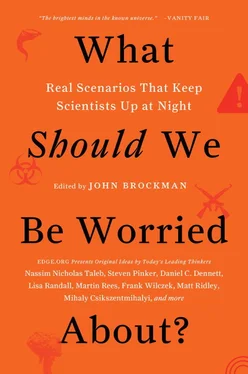Greece, 107, 166, 453
Greens, 51
Grothendieck, Alexander, 267
groupism, 4, 147–49
groupthink, 266
growth, 107–16
G-type stars, 147
Guatemala, 251
hacking, 284, 408–9
Haidt, Jonathan, 278–79
Hainmueller, Jens, 359
Hales, Thomas, 387
hallucinogenic drugs, 441, 443
handprints, 211–12
Hannay, Timo, 26–29
hantavirus, 202
Happé, Francesca, 273–74
happiness, 138, 301
harassment, 94
Harris, Sam, 259–60
Harvard Business School, 284
Harvard School of Public Health, 211
Haun, Daniel, 364–67
Hawking, Stephen, 72, 185
health care, 200–205
heart disease, 201, 230, 234, 370, 441
hedgehog/fox distinction, 51
Heffernan, Virginia, 134
Heider, Fritz, 273
Heisenberg, Werner, 192
helmets, 200, 204
Henry, John, 62
herd mentality, 281
heresy, 62, 63–64
heroes, 267–76, 282
Heyes, Cecilia, 350
hidden-variables theory, 193–94
Higgs, Peter, 272
Higgs boson, 139, 140, 174–75, 177–78, 180, 197, 300, 319
high blood pressure, 283
higher education, 346, 385–86, 390–93, 459, 466–67
higher mind, 87
Highfield, Roger, 272–76
Hillis, W. Daniel, 164–65
Hinduism, 81
Hiscox, Michael, 359
history, 61, 427–30, 444–46
HIV/AIDS, 46, 126, 201
Hobsbawn, Eric, 216
Hoffman, Donald D., 135–38
holography/complementarity, 185–86
Holton, Gerald, 224
Homer, 153
Homo erectus , 61, 80
homogenization, 80–85, 214–17, 281
Homo sapiens , 61, 114, 343–44
Hood, Bruce, 328–31
Hubble’s constant, 356
hubristic pride, 269–71
Huffington, Arianna, 283–84
Huffington Post , 91–92, 401
human capital, 346
Human Genome Project, 273, 288, 295, 299
human geography, 352–54
Human Microbiome Project (HMP), 297–98
human/nature divide, 312–14
human rights, 4–5, 243
Hume, David, 103
Humeau, Marguerite, 216–17
Humphrey, Nicholas, 454–55
Hypatia, 58
hypercivilization, 147
hyperworry, 372
Iacobini, Marco, 261–64
IBM, 171
ice ages, 147
identity theft, 316
idiocracy/stupidity, 343–46, 458–60
imagination, 198–99, 370–71
imagined threats, 370–71
immigration, 119–20, 124, 235, 236, 244
immunization, 201–2, 403–4
impact, 328–31
impulse control, 134, 221
income inequality, 108, 166–67, 171–73, 381
incompetent systems, 98–99
India, 115, 233, 234
indirect reciprocity, 273–74
individuality, 4, 33, 78–79, 267–68, 272–76. See also heroes; homogenization
Industrial Revolution, 31, 69, 289–90, 337, 384
infectious disease, 201–2, 296–97, 403–4. See also bacteria; viruses
influenza, 201, 202
information-ecosystem metaphor, 462
Information Revolution, 31, 134
Inquisition, 421
Instagram, 173, 255
instant gratification, 42–43
intellectual property rights, 98–99, 254–56, 316, 317
interdependencies, 358–63
intergenerational conflict, 229–32, 236–37. See also aging population
Intergovernmental Organizations (IGOs), 106
International Data Corporation, 171
International Space Station, 68–69
International Telecommunication Union, 318
Internet. See also social media
backup systems, 16, 17–18
cyberattack risks, 2, 12, 284, 316, 408–9
cyberspace, 53
David and Goliath scenario, 15
devaluation of written word and, 87, 90–92
electronic tattoos and, 450–53
fragility of complex systems, 19–21
illegal drugs and, 442
impact on adolescent brain development, 46
instant gratification and, 42–43
intellectual property rights, 254–56
leveling influence of, 14–16
new opportunities, 131–32
news articles on, 342
online silos, 401–2
patience deficit and, 42–43
Popular Culture and, 246–49
power and, 315–18
as reference library, 427
risks of interconnectedness, 12–13, 17–18, 280–82
risk to liberal democracy, 240–45
safe mode for, 17–18
search engines, 164–65, 461
“smart” solutions, 53–55
interplanetary economy, 67–71, 75–76
interstellar travel, 355–57
intersubjectivity, 87
inter-universal Teichmüller theory, 388
intimate-partner battering, 156, 157
investment banks, 159–63
IQ (intelligence quotient), 343–46, 458–60, 478
Iran, 118, 244, 456
Iraq, 1–2, 158
Islam, 62, 63, 65, 81
is-ought fallacy, 103–6
Italy, 235
Jacquet, Jennifer, 213
James, William, 41, 223
Japan, 118, 119, 124, 235
Jardin, Xeni, 286–88
Jefferson, Thomas, 453
Jeffery, Kate, 229–32
Jehovah’s Witnesses, 60–62
Jerome, St., 58
John of Patmos, St., 60
journalism, 36–37, 139–45, 150–53, 248–49, 342, 347–48, 379, 401–2
Judaism, 62, 65, 81
Kaczynski, Ted, 50–51
Kahneman, Daniel, 3, 223, 475
Kant, Immanuel, 105
Kauffman, Stuart A., 336–39
Kaufmann, Eric, 65
Kedrosky, Paul, 444–46
Kelly, Kevin, 117–20
Keltner, Dacher, 278–79
Kennedy, John F., 10
Kennedy, Robert, 108–9
Kenrick, Douglas T., 343–46
Kepler, Johannes, 336
Kerouac, Jack, 311
Keynesian economics, 112, 149
Khrushchev, Nikita, 10
Kickstarter, 212, 445
King, Stephen, 434–35
Kinsbourne, Marcel, 86–89
Kirilenko, Andrei, 172
Klein, Gary, 403–4
Knutson, Brian, 370–72
Kosko, Bart, 468–72
Kosslyn, Stephen M., 362–63
Krause, Kai, 319–21
Krauss, Lawrence M., 195–97
Kreye, Andrian, 206–8
Krishnan, Shunmuga, 43
Kuhn, Thomas, 198
kurtosis/fat tails, 464–67
Kurzban, Robert, 238–39
Kurzweil, Ray, 32, 34, 236
Lang, Serge, 267
language impairment, 420
Lanier, Jason, 359
Laplace, Marquis de, 339
Laplacian Demon, 339
Large Hadron Collider (LHC), 174–80, 183, 197, 198–99, 273
LaTeX, 385–86
Latinos, 119–20, 438–39
learning disabilities, 376
Leavis, F. R., 417
LeDoux, Joseph, 285
Lehman Brothers, 163, 465
Lehrer, Jonah, 269, 270
leverage, financial, 163
Levi, Margaret, 358–61
liberal democracy, 99, 100–102, 105–6, 112–13, 240–45, 248, 250–53
libertarianism, 51, 200–202, 316–17
Library of Congress, 255–56
lifestyle choices, 370–71
Lih, Andrew, 254–56
Linn, Marcia, 397
Lisi, Anthony Garrett, 225–28
literature, personal letters in, 90–91
living standards, 107–16
Livio, Mario, 188–90
Lloyd, Seth, 159–63
local cooperation, 365, 367
locality, 184–87
Lombrozo, Tania, 396–98
Lorentz, Hendrik, 181, 182
LSD, 443
Luther, Martin, 223
lying, 269–71
Lysenkoism, 66
MacNamara, Robert, 10
MAD (Mutually Assured Destruction), 6–8
Maddison, Angus, 107
magic, 168–70
malware, 79
manual skills, 306–9
many-worlds explanation, 192–93
Mao Zedong, 108
Marcus, Gary, 447–49
marijuana, 46
market economy, 81, 105–6. See also financial markets
Marolf, Donald, 183
Martin, Ursula, 325–27
Maslow, Abraham, 277
Massey Energy, 35
Massive Online Open Courses (MOOCs), 385–86, 390–93
material progress, 107–9, 319–24
mate value, 154–57, 323
mathematics, 273, 383–89
Читать дальше












